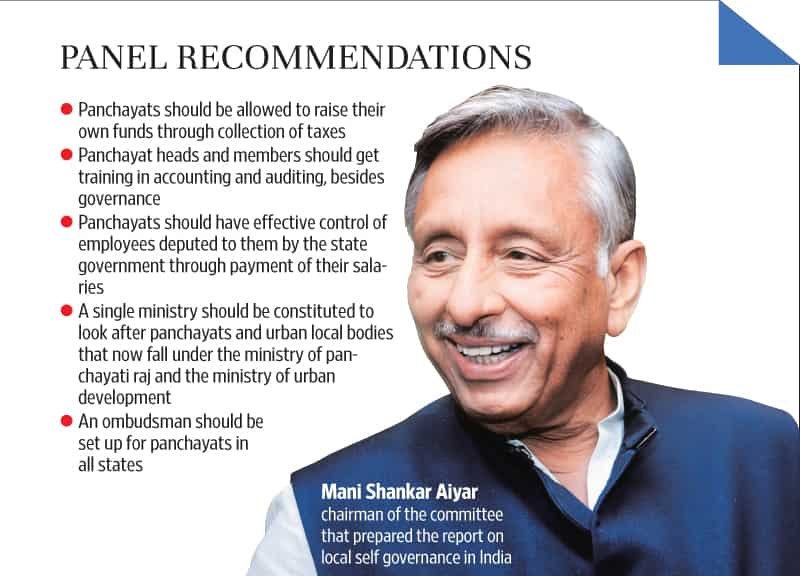- Home
- Prelims
- Mains
- Current Affairs
- Study Materials
- Test Series
Financially starving local bodies
- Decentralization can encourage competition among state governments to produce the most benefit for the society.
- However, current intergovernmental competition in India is destroying basic tenets of decentralisation.
- In many states, there has been no local body for long period of time.
- Next year, India will celebrate 30th anniversary of enactment of 73rd and 74th constitutional amendments.
- However, Elections in PRIs (Panchayati Raj Institutions) are still irregular.
- 73rd constitutional amendment act states about establishment of Panchayati Raj system in rural areas.
- 74th constitutional amendment act states about establishment of Municipality system in urban areas.
- Several states conducted local bodies (LBs) elections just because Union Finance Commission recommended grants for only “duly constituted local governments”.
Issues faced by local government
- There is inadequate devolution of powers between State government and local government.
- There is also a challenge of Proxy vote which goes against the very concept of a secret ballot as one has to disclose his or her preference to another individual, who in turn has to vote on his or her behalf.
- There is no guarantee that the proxy will vote for the candidate preferred by the voter, thereby vitiating the object of free and fair elections.
- Both rural local bodies (RLBs) and urban local bodies (ULBs) across the country are under lack of financial resources.
- RLBs are exclusively dependent on grants from State Finance Commissions (SFCs) or Union Finance Commission (UFC).
- They are rarely able to generate their own revenue.
- It is responsibility of SFCs to devolve resources between State and local body.
- But, SFCs in some states are either defunct or attention is not given to SFCs’ reports.
- SFCs should recommend measures for local bodies to raise their own tax and non-tax revenues.
Issues with SFCs
1. No establishment of SFCs properly:
- Article 243I of Constitution warrants States-
- To constitute SFCs to review financial position of RLBs and ULBs.
- Make suggestions to Governor about-
- Distribution of taxes between State and LBs.
- Determination of taxes, duties, etc., which may be assigned to or appropriated by LBs.
- Grant in aid to LBs by the State.
- As per constitution, States should have constituted their first SFC by April 1, 1994, and subsequent FCs after expiration of every five years.
- By now, Most States should have constituted at least their 5th FC.
- However, some States have not even constituted their third and fourth SFCs.
- Several states do not adhere to Constitution unless asked by courts.
2. Lack of proper resources and Infrastructure:
- SFCs are non-permanent bodies.
- Lack of proper office space is one of the reasons to seek extension for submitting SFC’s report.
- For example, 4th SFC of Haryana should have submitted its report by April 30, 2011.
- But SFC sought extension and submitted its report by June 30, 2014, due to lack of infrastructural facilities.
- SFC’s report include financial position of local bodies and recommendations to improve the condition.
3. Lack of data
- SFCs are not presented with accurate and updated data on the finances of local bodies.
- In the absence of data, recommendations by SFCs are ad-hoc opinion of the chairperson of SFC formed without any relation to data.
- No rigorous fiscal analysis is possible without disaggregated fiscal data for the PRIs and ULBs.
4. Action taken report (ATR)
- Under Article 243I (4)- Once the SFC submits its report, States are constitutionally bound to lay the report that explains the action taken before state legislature.
- There are cases where states failed in placing ATR before the legislature or took several years to do so.
- For example, 2nd SFC reports of Karnataka and Maharashtra and 3rd SFC reports of Gujarat were neither considered nor placed in the State legislature for many years.
- Action taken report by Kerala government was not submitted after placing 2nd SFC report in state legislature.
5. Failure to accept recommendations given by SFCs
- In Union Finance Commission, Union Government accepts nearly all recommendations.
- But State Government rejects even basic requests of SFCs.
- Even when recommendations are accepted, States fail to implement them.
- Example: Bihar government failed to release Devolution and Grant of FY 2015-16.
Finances at the Union level are under the democratic scrutiny. However, some states contravene the Constitutional provisions to finance local government repeatedly without facing any repercussions. States should devolve more powers and resources to local bodies. Intergovernmental competition should trigger better responses to local government to make progress possible from grassroot level.
Aiyar Report on PR to empower Gram Sabhas
- Gram Sabha should be empowered to monitor and make decisions on all social sector schemes — Central and State.
- Example- Mahatma Gandhi National Rural Employment Guarantee Act (MGNREGA) 2005 scheme and BRGF (Backward Regions Grant Fund) model are implemented by PRIs.
- Central Government should draft model Gram Sabha law to motivate State legislation.
- Freeze rotation of reserved seats for two or three terms to incentivise good work and facilitate capacity building of panchayat leadership.
- Incentivise PRIs for transparency and accountability and State Government to devolve some power and finance.
- Reorient outlook of bureaucracy at lower level towards panchayat.
- Strengthen collateral and institutional measures like electronic tagging of funds, setting up of a National Commission for Panchayat Raj










 Latest News
Latest News
 General Studies
General Studies